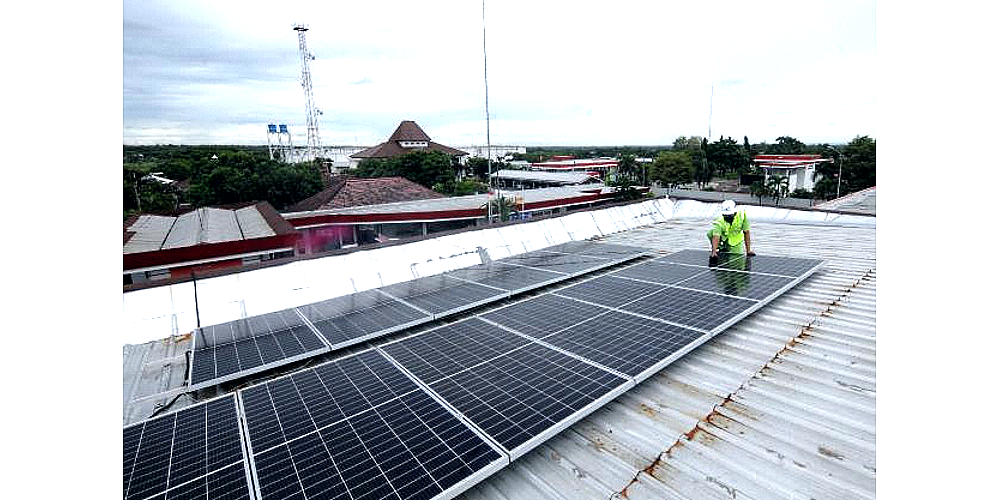
JAKARTA: Indonesia is planning to slash the targeted share of renewables in the national energy mix, a move seen by experts as a step back in the country’s ambition toward clean energy, while signalling its lighthearted attempt to part ways with fossil fuels.
The new target will hover at between 17 and 19 percent by 2025, as proposed by the National Energy Council (DEN).
Previously, the government had set a target of 23 percent for the same period.
Energy and Mineral Resources Minister Arifin Tasrif told reporters on Monday that renewable energy development had been painfully slow and this was partly due to the domination of coal-fired power plants.
“We have to be realistic,” Arifin said, when asked about the plan to lower the renewable energy target.
“We will adhere to the commitment we made, but we have to work toward it with what we have,” he added.
Southeast Asia’s largest economy has committed to cutting carbon emissions by relying less on coal and more on renewable sources of energy, but progress has been slow.
Renewables only made up 13 percent of Indonesia’s energy mix last year, according to the ministry’s data. It fell short of the 17.9 percent target that the government has aimed for the year to realise its 2025 target.
The figure only marked a minuscule increase from the 12.3 percent achieved the previous year.
The latest figure only inched up slightly from the 9.2 percent realised in 2019, energy ministry data also show.
In contrast, Indonesia saw its coal production reach an all-time high, at 775 million tons, last year.
More than 66 percent of it was exported with the rest for domestic consumption.
“Our coal exports have also increased, based on [rising] demand […] and disruption of other energy alternatives,” Arifin said.
Deon Arinaldo, energy transformation program manager at the Institute for Essential Services Reform (IESR) said revising the target would lead to uncertainty and dampen investor confidence in the country.
He blamed this on Indonesian renewable energy only growing around 0.5 percent annually in the last five years, making the DEN decision not entirely surprising.
“The government needs to implement more transformative policies,” he told The Jakarta Post on Tuesday, noting that deployment of PLN’s renewable energy projects was slower than planned in its long-term electricity procurement plan (RUPTL).
Meanwhile, skyrocketing coal production last year signalled that the country remained reliant on the commodity, including as a source of income, he said.
“Indonesia must focus on deploying just energy transition strategies in each region, especially in coal-producing regions. Ideally, the revenue from coal should be used to support energy transition efforts,” he said.
The planned revision also comes after Indonesia decided to lower its ambitions on a coal phase-out, partly due to lack of funding, which was supposed to involve the early retirement of several of its coal fleets to make way for renewable energy development.
The energy ministry said in November that it would instead opt for a coal phase-down, which means the government and PLN would keep coal-fired power plants running until their operational periods end, but they vowed to implement means to reduce carbon emissions, including through carbon capture technology and co-firing.
Surya Darma, chairman of the Indonesia Centre for Renewable Energy Studies (ICRES) told the Post on Tuesday that, given the speed of the country’s renewable energy development progress, it would remain difficult to achieve the newly set 17 percent energy mix target.
He urged the government to immediately introduce policies that could improve the sector’s governance, provide legal certainty for businesses and set a competitive price for renewables to ensure the favourable return needed by investors.
“If the government wants to set a lower target, it will still need to put in a strenuous effort to achieve the 70 percent renewables target by 2060,” he said.
Responding to queries about the missed renewable energy target, Arifin said the government would continue pursuing the 2025 goal through various means, including pushing rooftop solar panel usage and building 10.6 gigawatts more renewable energy plants within the remaining time.
“Do we have the adequate infrastructure in place [to achieve the target]? We [stakeholders] must work to perfect the system,” said the energy minister, citing that decreasing renewable energy demand also played a role in the slow adoption.
ADVERTISEMENT
ADVERTISEMENT








































